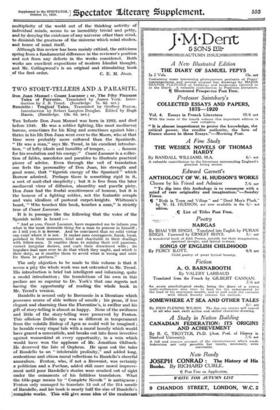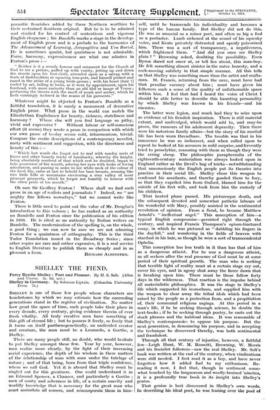TWO STORY-TELLERS AND A PARASITE.
Don Juan Manuel : Count Lucanor ; or, The Fifty Pleasant Tales of Patronio. Translated by James York. Intro- duction by J. B. Trend. (Routledge. 7s. 6d. net.) Sandell° : Tragical 'Tales. Translated by Geoffrey Fenton. Introduction by Robert Langton Douglas. Edited by Hugh Harris. (Routledge. 12s. 6d. net.) THE -Infante Don Juan Manuel was born in 1282, and died
before 1349. He was a soldier fighting, like most mediaeval barons, sometimes for his King and sometimes against him ; thrice in his life Don Juan went over to the Moors, who at that time were probably more cultured than the Spaniards.
" He was a man," says Mr. Trend, in his excellent introduc- tion," of lofty ideals and humility of temper, . . . famous
for his-resolution and his energy." Count Lucanor is a collec- tion of fables, anecdotes and parables to illustrate practical pieces of advice. Even through the veil of translation one feels the personality of Don Juan, his strength and good sense, that "tigerish energy of the Spaniard" which Borrow admired. Perhaps there is something rigid in it, a sort of mail-clad simplicity ; but it is free from the later mediaeval vices of diffusion, absurdity and puerile piety.
Don Juan had the feudal -sensitiveness of honour, but it is the honour of a fighting soldier, not the fantastic scruple and vain idealism of pastoral carpet-knights. Whitman's boast," Who touches this book, touches a man," is strictly true of Count Lueanor.
It is in passages like the following that the voice of the Spanish noble is heard :—
" And as you, Count Lueanor, have requested me to inform you what is the most desirable- thing for a man to possess in himself ; so I.tell you it is honour. And be convinced that no solid virtue can exist where it is not. It makes men courageous, frank, loyal, polished in their manners, kind and charitable in their dealings with fellow-men. It enables them to subdue their evil passions, correct irregular desires, and curb their disordered wills ; its impulses lead men ever to do that which they ought, and which is their duty, as it enables them to avoid what is wrong and unfit for them to perform."
The only objection to he made to this volume is that it seems a pity the whole work was not entrusted to Mr. Trend.
His introduction is brief but intelligent and informing, quite a model introduction ; the translations of his own in this preface are so superior to Dr. York's that one regrets not having the opportunity of reading the whole book in Mr. Trend's version.
Bandello is second only to Boccaccio in a literature which possesses scores of able writers of novelle ; his prose, if less elegant and charming than the Florentine's, is swifter and his gift of story-telling is almost as happy. None of the swiftness and little of the stnry-telling were preserved by Fenton. This officious Dublin spy was as different in temperament from the volatile Bishop of Agen as could well be imagined ; he heralds every risque tale with a moral homily which would have graced a conventicle, and. breaks out into fierce invective
against womankind at every opportunity, in a vein which would have won the applause of Mr. Jonathan Oldbuck. Ile deserved the fate of Orpheus. Ile spun out the tales of Bandello to an "intolerable prolixity," and added long, sententious and otiosa moral reflections to Bandello's cheerful amoralism. Fenton, who, if not a Brownist, was certainly a politician and a Puritan, added still more moral improve- _ meat until poor Bandello's stories were crushed out of sight under the ornaments of his faithless translators. What the title-page means by "Complete Novels" is ambiguous ; Fenton only managed to translate 13 out of the 214 novelle of Bandello, and his book-is nearly half the size of Bandello's lecaupiete works. This will, give some idea of tbe exuberant
parasitic flourishes added by these Northern worthies to their restrained Southern original. But he is to be admired and studied for his control of sententious and vigorous English eloquence ; his Bandello marks a stage in the develop- ment of English prose and is a prelude to the harmonies of The Advancement of Learning, Areopagitica and Urn Burial. Ile is sometimes quaint, but quaintness is not admirable. Force, harmony, expressiveness are what one admires in Fenton's prose
"Neither is it a seemly honour and ornament for the Church of God to see a prelate, puffed up with vanity, jetting up and down the streets upon his foot-cloth, attended upon as a satrap with a train of dashbucklers or squaring toss-pots, and himself pinked and razed in the attire of a young bride-groom ; with his heart [hair 7] curled by art, falling in locks, as it were by appointment, upon his forehead, with more curiosity than an old idol or image of Venus ; perfuming the streets with the smell of musk and amber, which he bath cunningly inclosed in the seams of his garments."
Whatever might be objected to Fenton's Bandello as a faithful translation, it is surely a monument of decorative English prose. What prose in the world can match the Elizabethan Englishmen for beauty, richness, stateliness and
harmony ? Where else will you find language so pithy, vivid and expressive ? Without labour or self-conscious effort (it seems) they wrote a prose in comparison with which our own prose of to-day seems cold, inharmonious, trivial. Compare the erotic descriptions of a contemporary novelist, nasty with sentiment and suggestion, with the directness and beauty of this :—
" Which last words she forgot not to seal with sundry sorts of kisses and other homely tricks of familiarity, whereby the knight, being absolutely resolved of that which orst he doubted, began to take possession of her mouth, adoring her eyes with looks of loving admiration, and passing in order to her white neck of the colour of the fresh lily, came at last to behold her bare breasts, seeming like two little hills or mountains environing a rosy valley of most pleasant prospects, which he forgat not humbly to honour with the often print of his mouth."
Oh rare Sir Geoffrey Fenton ! Where shall we find such prose in an age of realists and journalists ? Indeed, we "are mighty fine fellows nowadays," but we cannot write like Fenton; There is little need to point out the value of Mr. Douglas's introduction to this volume ; he has ranked as an authority on Bandello and Fenton since the publication of his edition in 1898. He is cited as an authority by Italian writers on Bandello. The modernization of the spelling is, on the whole, a good thing ; we can now be sure we are not admiring Fenton for a quaintness of orthography. This is the third Tudor Translation issued in the Broadway Series ; since other copies are rare and rather expensive, it is a real service to English literature to publish them so cheaply and in so pleasant a form.
RICHARD ALDINGIVN.



























































 Previous page
Previous page